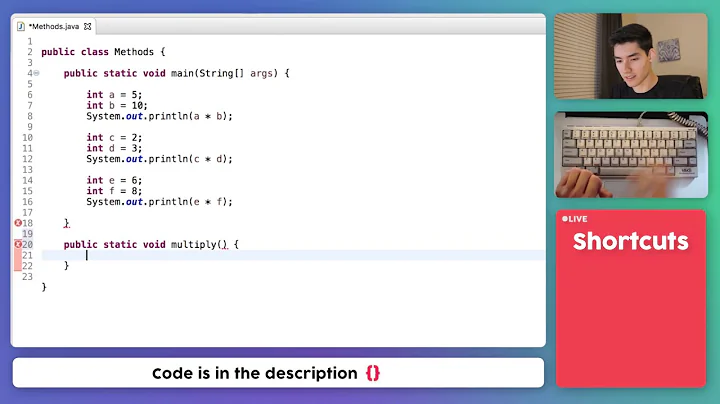Making java method arguments as final
Solution 1
As a formal method parameter is a local variable, you can access them from inner anonymous classes only if they are declared as final.
This saves you from declaring another local final variable in the method body:
void m(final int param) {
new Thread(new Runnable() {
public void run() {
System.err.println(param);
}
}).start();
}
Solution 2
Extract from The final word on the final keyword
Final Parameters
The following sample declares final parameters:
public void doSomething(final int i, final int j)
{
// cannot change the value of i or j here...
// any change would be visible only inside the method...
}
final is used here to ensure the two indexes i and j won't accidentally be reset by the method. It's a handy way to protect against an insidious bug that erroneously changes the value of your parameters. Generally speaking, short methods are a better way to protect from this class of errors, but final parameters can be a useful addition to your coding style.
Note that final parameters are not considered part of the method signature, and are ignored by the compiler when resolving method calls. Parameters can be declared final (or not) with no influence on how the method is overriden.
Solution 3
The final prevents you from assigning a new value to the variable, and this can be helpful in catching typos. Stylistically you might like to keep the parameters received unchanged and assign only to local variables, so final would help to enforce that style.
Must admit I rarely remember to use final for parameters, maybe I should.
public int example(final int basicRate){
int discountRate;
discountRate = basicRate - 10;
// ... lots of code here
if ( isGoldCustomer ) {
basicRate--; // typo, we intended to say discountRate--, final catches this
}
// ... more code here
return discountRate;
}
Solution 4
It doesn't make a lot of difference. It just means that you can't write:
stamp = null;
fTz = new ...;
but you can still write:
stamp.setXXX(...);
fTz.setXXX(...);
It's mainly a hint to the maintenance programmer that follows you that you aren't going to assign a new value to the parameter somewhere in the middle of your method where it isn't obvious and might therefore cause confusion.
Solution 5
The final keyword when used for parameters/variables in Java marks the reference as final. In case of passing an object to another method, the system creates a copy of the reference variable and passes it to the method. By marking the new references final, you protect them from reassignment. It's considered sometimes a good coding practice.
Related videos on Youtube
John
Updated on June 06, 2020Comments
-
John almost 4 years
What difference that
finalmakes between the code below. Is there any advantage in declaring the arguments asfinal.public String changeTimezone( Timestamp stamp, Timezone fTz, Timezone toTz){ return .... } public String changeTimezone(final Timestamp stamp, final Timezone fTz, final Timezone toTz){ return .... }-
Vishy over 13 yearsThere are code analysers which warn if a parameter is re-used or reassigned. (Same for local variables) IMHO, This is a better way to catch such parameters if you find changing them is undesireable.
-
 james.garriss over 6 yearsPossible duplicate of Why should I use the keyword "final" on a method parameter in Java?
james.garriss over 6 yearsPossible duplicate of Why should I use the keyword "final" on a method parameter in Java? -
Sid over 5 yearsI feel Java should make all input method arguments as final by default. And then if I want to modify the reference, I would have to do it manually. That way, guilt factor would prevent many such cases.
-
-
Donal Fellows over 13 years+1: This is an important use case, and the only time when you need it. (The rest of the time it's just a matter of what's convenient for helping the programmer.)
-
Flo almost 11 yearsThat is not quite right. Even if the argument dateOfBirth is changed to another value in method2() this would have no effect on method2(), since Java passes by value and not by reference.
-
KodeWarrior over 10 yearsMay I ask the reasoning behind this ?
-
 João dos Reis almost 10 yearsMight be better to use objects rather than primitives for this example, as primitive changes will always only be visible inside the method. And in the case of objects, you can still change them. You just can't point at a new object. In fact now I think about it, final doesn't really change anything compared to leaving it out, other than saving a variable declaration with AICs and having the compiler point out accidental modifications of parameters that you didn't want to modify for some reason.
João dos Reis almost 10 yearsMight be better to use objects rather than primitives for this example, as primitive changes will always only be visible inside the method. And in the case of objects, you can still change them. You just can't point at a new object. In fact now I think about it, final doesn't really change anything compared to leaving it out, other than saving a variable declaration with AICs and having the compiler point out accidental modifications of parameters that you didn't want to modify for some reason. -
 Sam003 almost 9 yearsI have to add something: if parameters are primitive, I don't see any differences. Besides, if parameters are Collections(a list of objects...), adding final could not prevent them being modified.
Sam003 almost 9 yearsI have to add something: if parameters are primitive, I don't see any differences. Besides, if parameters are Collections(a list of objects...), adding final could not prevent them being modified. -
Sid almost 9 yearsImmutability is always a desirable trait. Java does not have it out of the box. Making variables final at least ensures reference integrity.
-
 Sam003 almost 9 yearsI agree. But if we really want to achieve immutability for objects, we could try make a deep clone.
Sam003 almost 9 yearsI agree. But if we really want to achieve immutability for objects, we could try make a deep clone. -
Amit Parashar over 8 yearsNo more necessary with Java 8.
-
simgineer over 6 yearsSo with java 8 you can access from an inner class without it being final?
-
 PeterMmm over 6 years@simgineer read here: stackoverflow.com/questions/28408109/…
PeterMmm over 6 years@simgineer read here: stackoverflow.com/questions/28408109/… -
 JoseHdez_2 over 5 yearsGreat example of how declaring arguments as final can be useful. I'm partial to this but they're also a mouthful for 3+ parameters.
JoseHdez_2 over 5 yearsGreat example of how declaring arguments as final can be useful. I'm partial to this but they're also a mouthful for 3+ parameters. -
 varun about 5 years@AmitParashar True, but Java 8 is just saving you from having to use the keyword "final" every time you have to use the variable in an inner class... The reality is that the compiler is merely making the finality implicit, you still need the variable to be effectively final... So, you still get a compile time error in case you try to assign to it later! Java 8: SNEAK 100 :)
varun about 5 years@AmitParashar True, but Java 8 is just saving you from having to use the keyword "final" every time you have to use the variable in an inner class... The reality is that the compiler is merely making the finality implicit, you still need the variable to be effectively final... So, you still get a compile time error in case you try to assign to it later! Java 8: SNEAK 100 :) -
Amit Parashar about 5 years@varun agreed +1
-
mcy over 2 years@KodeWarrior I know it is a little late, but the reasoning behind is the concept of
closures. -
 Agustí Sánchez over 2 yearsfinal does not help with immutability at all. The changes to primitive values are lost outside the method scope whether the parameter is marked as final or not. Changes to mutable objects are propagated outside the scope whether the parameter is marked as final or not. "Useless" is the word that comes to my mind.
Agustí Sánchez over 2 yearsfinal does not help with immutability at all. The changes to primitive values are lost outside the method scope whether the parameter is marked as final or not. Changes to mutable objects are propagated outside the scope whether the parameter is marked as final or not. "Useless" is the word that comes to my mind. -
Sid over 2 yearsAn immutable reference is the first step towards immutability.







